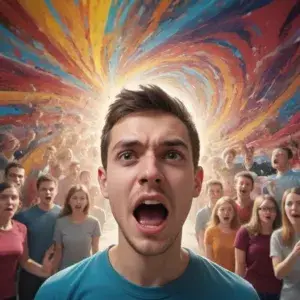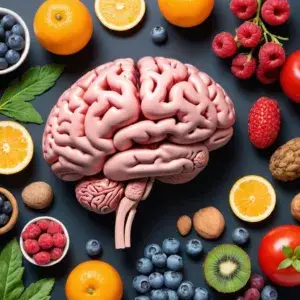Table of Contents
Anxiety can affect everyone, causing feelings of uneasiness, nervousness, and panic. While lifestyle adjustments such as meditation and exercise can assist, pills known as nootropics are gaining popularity for their ability to lower anxiety and enhance cognitive performance. In this article, we’ll look at the finest nootropics for anxiety, covering both individual ingredients and nootropic stacks designed to improve mental clarity and promote tranquility.
What Are Nootropics, and How Can They Help With Anxiety?
Nootropics are cognitive enhancers that boost brain function, concentration, memory, and mood. When it comes to anxiety, certain nootropics may help balance neurotransmitters, minimize brain overactivity, and improve overall emotional wellness. Some nootropics are especially effective at lowering anxiety because they boost GABA (a calming neurotransmitter), regulate cortisol (the stress hormone), or stimulate serotonin production, which stabilizes mood.
The Best Nootropics for Anxiety Relief
Let’s look at some of the most well-researched nootropics that have shown potential in reducing anxiety:
1. L-theanine.
What it does: L-Theanine is an amino acid found largely in tea leaves, specifically green tea. Studies have demonstrated that L-Theanine enhances relaxation without inducing drowsiness by elevating alpha brain waves, associated with a serene yet attentive mental state. This makes it perfect for relieving anxiety while remaining focused.
How it works: L-theanine regulates serotonin and dopamine levels, two neurotransmitters important in mood regulation, while also increasing GABA activity, which promotes relaxation.
Scientific evidence: A study published in the journal Pharmacology, Biochemistry, and Behavior discovered that L-Theanine dramatically reduced anxiety symptoms in subjects who were subjected to stressful tasks.
2. Ashwagandha.
What it does: Ashwagandha is an adaptogenic herb that has traditionally been used in Ayurvedic therapy. It is well-known for its ability to alleviate anxiety and stress, making it an excellent addition to any anti-anxiety nootropic stack.
How it works: This herb lowers cortisol levels, which are commonly increased during times of chronic stress and anxiety.
Scientific support: The Indian Journal of Psychological Medicine published a randomized, double-blind, placebo-controlled study that found Ashwagandha root extract significantly reduced participants’ stress and anxiety levels.
3. Rhodiola rosea
What it does: Rhodiola Rosea, another adaptogen, has been shown to alleviate mental fatigue and stress. It boosts resilience to stress while also improving mood, making it an ideal choice for anxiety relief.
How it works: Rhodiola supports balanced levels of cortisol and serotonin, key elements in managing anxiety.
Scientific support: According to a paper published in Phytomedicine, Rhodiola Rosea has significant anti-fatigue and anti-stress properties, making it beneficial to patients suffering from anxiety.
4. Bacopa Monnieri.
What it does: Bacopa Monnieri, which has traditionally been used in Ayurvedic medicine, improves memory and cognitive ability while also having considerable anti-anxiety properties.
How it works: Bacopa increases GABA receptor sensitivity and balances neurotransmitter levels, which can help alleviate anxiety and stress.
Scientific support: Research published in Evidence-Based Complementary and Alternative Medicine discovered that Bacopa Monnieri reduced anxiety symptoms in elderly people.
5. Lion’s Mane Mushroom
What It Does: Lion’s Mane is a naturally occurring mushroom with neuroprotective properties. Researchers report that it enhances cognitive performance and mood stability by reducing inflammation and enhancing nerve growth factors.
How it works: Lion’s Mane may relieve anxiety by stimulating the generation of neurotrophic factors that increase brain health and mood.
Scientific support: A small human trial published in Biomedical Research showed that participants who consumed Lion’s Mane mushroom had reduced anxiety and irritation compared to a placebo group.
6) Magnesium L-Threonate
What it does: Magnesium is an essential mineral that plays a role in over 300 enzymatic processes in the body, including regulating the nervous system. Magnesium L-Threonate is a highly accessible form that easily passes through the blood-brain barrier.
How it works: Magneisum works by supporting neurotransmitter balance, particularly GABA, while reducing tension and encouraging relaxation, making it an important factor in anxiety reduction.
Scientific support: A Neuropharmacology study found that magnesium deficiency can lead to anxiety-like behavior and that magnesium supplementation can reverse this effect.
Nootropic Stacks for Anxiety.
While individual nootropics are effective, combining them into nootropic stacks can bring additional benefits. Here are some of the greatest nootropic stacks specifically designed to reduce anxiety:
1. L-Theanine + Caffeine Stack.
Caffeine is a popular stimulant that can at times cause jitteriness and anxiety. However, when paired with L-Theanine, the relaxing effects of L-Theanine counteract the stimulating characteristics of coffee. This stack is perfect for people who want to be awake and focused without the anxiety that coffee can cause.
Caffeine improves alertness by raising dopamine and norepinephrine, whereas L-Theanine promotes calmness by increasing alpha brain waves. The end result is a balanced mood and sustained focus.
2. Ashwagandha and Rhodiola Rosea Stack
Combining two adaptogens, such as Ashwagandha and Rhodiola Rosea, is an effective strategy to lower anxiety while increasing energy and resilience to stress. This stack is most effective for people struggling with persistent stress and anxiety-related exhaustion.
How it works: Ashwagandha reduces cortisol levels, while Rhodiola Rosea improves mood by regulating neurotransmitters. Together, they offer a holistic approach to stress relief and mental clarity.
3. Bacopa Monnieri with Lion’s Mane Mushroom Stack.
For people looking to improve cognitive performance while also managing anxiety, the Bacopa Monnieri and Lion’s Mane combo is an excellent choice. This mixture not only relieves stress and anxiety, but it also promotes long-term brain health.
How it works: Bacopa Monnieri reduces anxiety by regulating neurotransmitter levels, whereas Lion’s Mane stimulates the formation of new brain cells, hence improving cognitive function and mood stability.
How to Select the Best Nootropic for Anxiety
When selecting nootropics for anxiety, you should examine your present health, medications, and lifestyle. Always speak with a healthcare practitioner, especially if you are pregnant, nursing, or have a pre-existing condition. Furthermore, you can combine many of these nootropics to create a stack that meets your specific needs.
Nootropics can provide a natural and effective alternative to reduce anxiety without the risks associated with pharmaceutical drugs. Choosing the correct nootropic ingredients and stacks can help you relax, focus better, and feel better in general.
To achieve the best results, combine some of the nootropics described in this article, such as L-Theanine, Ashwagandha, or Bacopa Monnieri, to construct your own anti-anxiety stack. Before beginning any new supplement regimen, consult with a healthcare practitioner, and always choose high-quality, research-backed nootropics for best outcomes.
Best Nootropic Stacks for Anxiety
1. Onnit Alpha Brain.
Key ingredients: L-Theanine, Bacopa Monnieri, and L-Tyrosine.
Why It Fits: Alpha Brain is designed to boost cognitive performance and focus, with ingredients such as L-Theanine and Bacopa Monnieri that alleviate stress and anxiety. It promotes both brain function and mood stabilization.
Amazon rating: 4.5 stars (over 10,000 reviews).
Popular For: Enhancing Cognitive Function, Reducing Stress, and Supporting Memory
2. MindLab Pro.
Key Ingredients: Lion’s Mane, Rhodiola Rosea, Bacopa Monnieri, L-Theanine
Why It Fits: This stack combines a variety of anti-anxiety nootropics, including Rhodiola Rosea, Bacopa Monnieri, and L-Theanine, which work together to lower anxiety while increasing mental clarity and focus. Lion’s Mane also promotes nerve growth factor for brain health, providing a cognitive boost.
Amazon rating: 4.6 stars (2,500+ reviews).
Popular For: stress reduction, cognitive function, and mood stabilization.
3. Genius Joy
Key Ingredients: Rhodiola Rosea, L-Theanine, Ashwagandha, 5-HTP
Why It Fits: Genius Joy is a nootropic stack that contains L-Theanine and potent adaptogens such as Rhodiola Rosea and Ashwagandha to improve mood and reduce anxiety. This combination regulates cortisol levels, resulting in calm and concentrated energy that is beneficial for stress and anxiety management.
Amazon rating: 4.4 stars (over 3,000 reviews).
Popular For: Anxiety reduction, mood enhancement, stress relief
References:
1. Nobre, A. C., Rao, A., & Owen, G. N. (2008). L-theanine, a natural constituent in tea, and its effect on mental state. Pharmacology, Biochemistry, and Behavior, 90(1): 186–187.
2. K. Chandrasekhar, J. Kapoor, and S. Anishetty (2012). A prospective, randomized, double-blind, placebo-controlled study of safety and efficacy of a high-concentration full-spectrum extract of ashwagandha root in reducing stress and anxiety in adults. Indian Journal of Psychological Medicine, 34(3): 255-262.
3. Panossian, A., & Wikman, G. (2010). Effects of adaptogens on the central nervous system and the molecular mechanisms associated with their stress-protective activity. Phytomedicine, 17(6), 481–493.
4. Calabrese, C., Gregory, W. L., Leo, M., Kraemer, D., Bone, K., & Oken, B. (2008). The effects of a standardized Bacopa monnieri extract on cognitive performance, anxiety, and depression in the elderly: a randomized, double-blind, placebo-controlled trial. Evidence-Based Complementary and Alternative Medicine, 5(2), 183–184.
5. Nagano, M., Shimizu, K., Kondo, R., & Hayashi, S. (2010). Reduction of depression and anxiety by 4 weeks of Lion’s Mane mushroom (Hericium erinaceus) intake. Biomedical Research, 31(4), 231-236. 6. Eby, G. A. & Eby, K. L. (2006). Magnesium for Treatment-resistant Depression: A Review and Hypothesis. Neuropharmacology, 28(3): 208–210.




